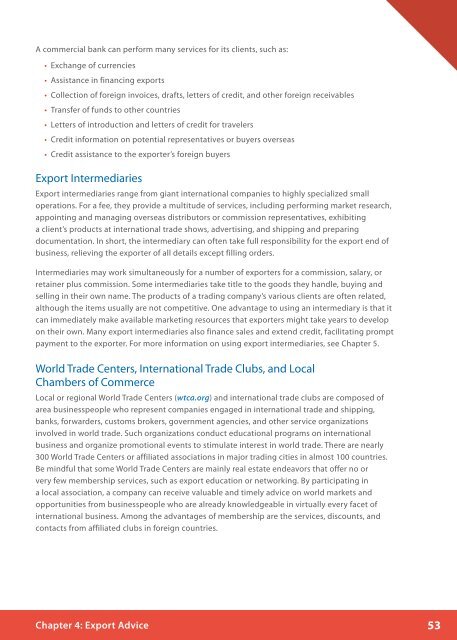basic-guide-to-exporting_Latest_eg_main_086196
basic-guide-to-exporting_Latest_eg_main_086196
basic-guide-to-exporting_Latest_eg_main_086196
Create successful ePaper yourself
Turn your PDF publications into a flip-book with our unique Google optimized e-Paper software.
A commercial bank can perform many services for its clients, such as:• Exchange of currencies• Assistance in financing exports• Collection of foreign invoices, drafts, letters of credit, and other foreign receivables• Transfer of funds <strong>to</strong> other countries• Letters of introduction and letters of credit for travelers• Credit information on potential representatives or buyers overseas• Credit assistance <strong>to</strong> the exporter’s foreign buyersExport IntermediariesExport intermediaries range from giant international companies <strong>to</strong> highly specialized smalloperations. For a fee, they provide a multitude of services, including performing market research,appointing and managing overseas distribu<strong>to</strong>rs or commission representatives, exhibitinga client’s products at international trade shows, advertising, and shipping and preparingdocumentation. In short, the intermediary can often take full responsibility for the export end ofbusiness, relieving the exporter of all details except filling orders.Intermediaries may work simultaneously for a number of exporters for a commission, salary, orretainer plus commission. Some intermediaries take title <strong>to</strong> the goods they handle, buying andselling in their own name. The products of a trading company’s various clients are often related,although the items usually are not competitive. One advantage <strong>to</strong> using an intermediary is that itcan immediately make available marketing resources that exporters might take years <strong>to</strong> developon their own. Many export intermediaries also finance sales and extend credit, facilitating promptpayment <strong>to</strong> the exporter. For more information on using export intermediaries, see Chapter 5.World Trade Centers, International Trade Clubs, and LocalChambers of CommerceLocal or r<strong>eg</strong>ional World Trade Centers (wtca.org) and international trade clubs are composed ofarea businesspeople who represent companies engaged in international trade and shipping,banks, forwarders, cus<strong>to</strong>ms brokers, government agencies, and other service organizationsinvolved in world trade. Such organizations conduct educational programs on internationalbusiness and organize promotional events <strong>to</strong> stimulate interest in world trade. There are nearly300 World Trade Centers or affiliated associations in major trading cities in almost 100 countries.Be mindful that some World Trade Centers are <strong>main</strong>ly real estate endeavors that offer no orvery few membership services, such as export education or networking. By participating ina local association, a company can receive valuable and timely advice on world markets andopportunities from businesspeople who are already knowledgeable in virtually every facet ofinternational business. Among the advantages of membership are the services, discounts, andcontacts from affiliated clubs in foreign countries.Chapter 4: Export Advice53





